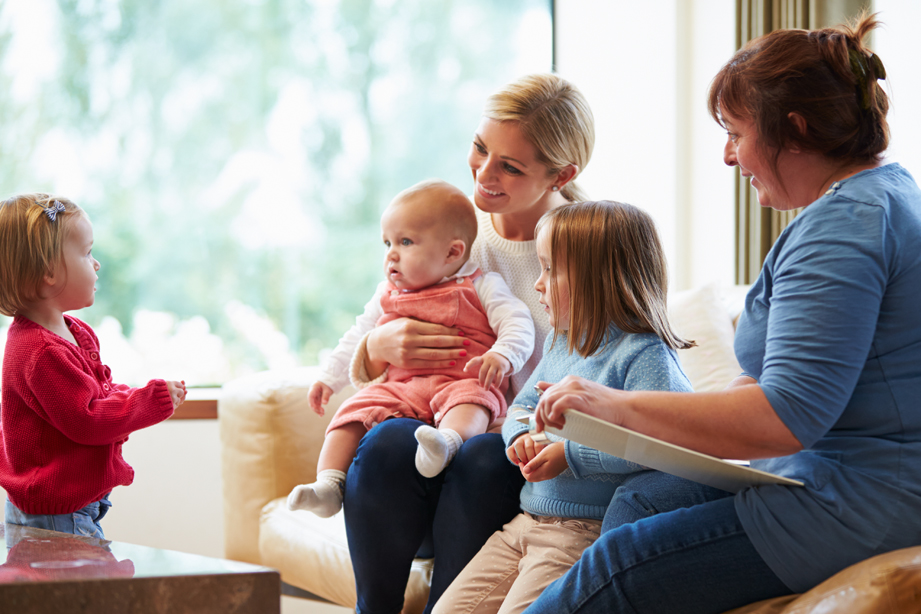Equipping Service Providers to Empower Parents: KBHN to Partner with CanChild on New Family-Support Project
March 15, 2021 | News

Parents who’ve recently learned that their young child has a disability often don’t feel prepared to meet the challenges ahead. This is part of why investigators at McMaster University’s CanChild Centre for Childhood Disability Research have been developing a series of online workshops called ENVISAGE: ENabling VISions And Growing Expectations. Co-designed by researchers and parents in Canada and Australia, this program gives parents up-to-date information, skills and perspectives they’ll need to navigate the ups and downs of raising their child. By exploring topics such as the six key areas to focus on for every child’s healthy development (function, family, fitness, fun, friends and future), ENVISAGE aims to help parents feel less stressed, more competent and more empowered.
However, parents aren’t usually the only adults in the child’s life. The course’s participants have been quick to point out that service providers such as doctors, educators, therapists and allied healthcare professionals should be on the same page. In response to this feedback, the team behind ENVISAGE plans to create, pilot and evaluate ENVISAGE-SP (ENVISAGE for Service Providers), a new adapted version of the ENVISAGE program aimed specifically for service providers. If successful, it will ensure that service providers are familiar with recent advances in understanding childhood disability and equipped to set shared expectations and priorities with parents. KBHN will be partnering with CanChild for this project, which was awarded a Canadian Institutes of Health Research Project Grant on Wednesday, March 3, 2021.
“Raising a child with an impairment adds extra stress and worry on top of the challenges of being a parent,” says co-investigator Peter Rosenbaum about the rationale for ENVISAGE-SP. “And I have believed for a long time that some of what we professionals do adds to that stress unintentionally. At best, we don’t do much to moderate those impacts. I believe we could actually engage in activities that would prevent some of that parental stress and mental-health morbidity.”
Particularly during the time following a diagnosis, parents’ interactions with service providers set the tone for how they’ll think about their situation and experience their parenting journey, according to parent co-investigator Rachel Martens. “I grew up around childhood disability,” she says. “I was taught about it in a way that led to acceptance and seeing and loving kids with disabilities as the awesome kids they are. But for many parents, childhood disability is a new concept. I hope that service providers can find an elegant start to their relationships with families.”
Over the coming months, service providers, parents and researchers will work together to adapt the existing version of ENVISAGE. Next, they’ll offer ENVISAGE-SP to an initial group of service providers and interview them about their impressions. “For instance, we’ll ask about their perceptions of the program’s acceptability and feasibility of doing a program like this,” says co-investigator Andrea Cross. “That will guide us in taking the next steps toward disseminating the program to more service providers across Canada and internationally.” The team will also look at course outcomes such as changes to participants’ beliefs about family-centred service and their ability to communicate and collaborate effectively with parents.
To support this work, KBHN will be sponsoring a graduate student to assist the ENVISAGE-SP team. “We have a large trainee component and will be involving several post-doctoral fellows and PhD students in this project,” says Cross.
“KBHN is delighted to support CanChild on their newest project and to support the next generation of trainees in childhood disability,” said Nicola Lewis, Chief Executive Officer for Kids Brain Health. “ENVISAGE will undoubtedly make a significant impact on the lives of families by empowering parents and engaging service providers.”
Parents will continue their involvement as well. “It’s nice to be able to put all of the experience I have as a parent, and information I’ve collected from other people as well, into a project that will likely make a positive change,” says Martens. “It’s very hopeful.”